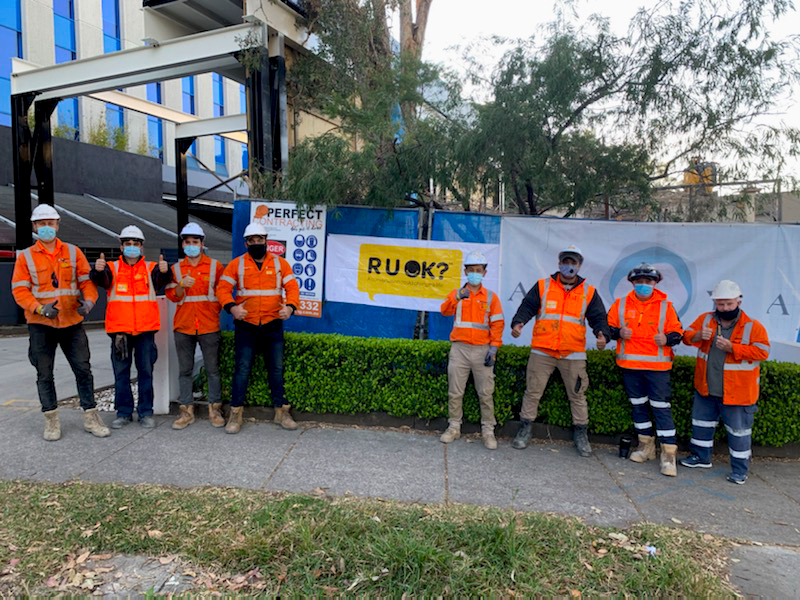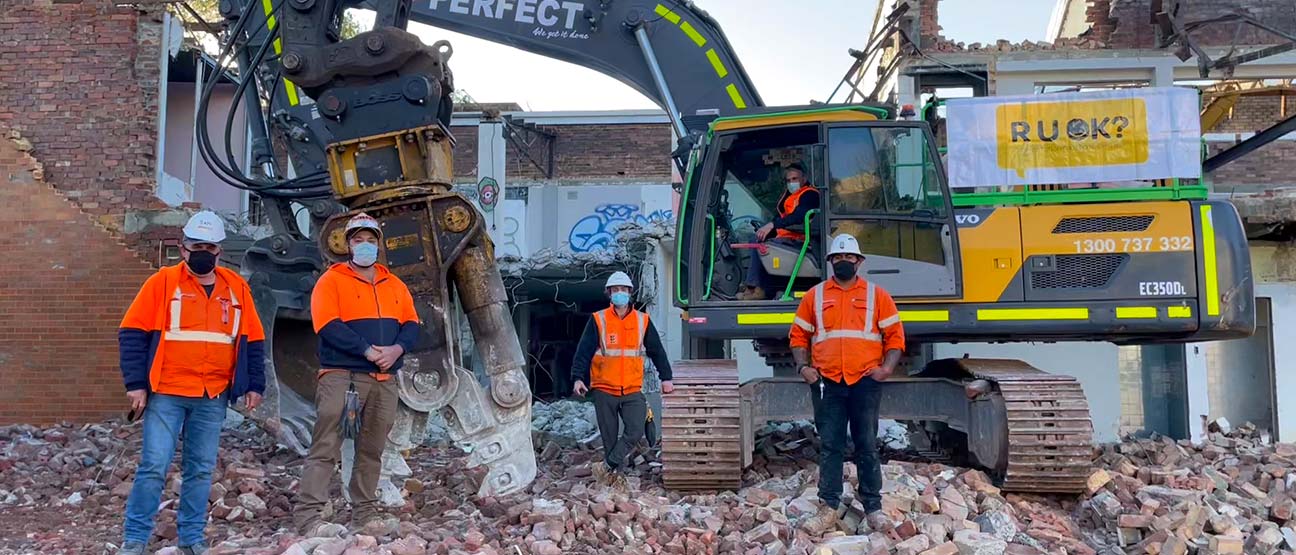Perfect is proud to support R U OK? Day on our sites to spread awareness for mental health and fight the stigma about talking about it in the construction industry, while helping raise awareness for this amazing charity and all the work it does.
Construction workers are often faced with a ‘harden up’ attitude and fear of being judged as weak when it comes to opening up about mental health. It’s important to ask the question, “Are you OK?” if someone seems to be doing it tough.

We want everyone in Perfect to feel connected and supported through life’s challenges. You know better than anyone else the pressures your colleagues face each day. Because you see your workmates often, you’re in a great position to notice changes in their mood, behaviour, tone or appearance.
We want to encourage everyone in Perfect to find the time and confidence to check in with co-workers and ask, “Are you OK?” So please take this opportunity to check in with your Perfect team members and see how they are doing. You’ve got what it takes to have an R U OK? conversation.
But Are You Really, OK?
Mental health can be a tricky minefield, especially in male-dominated industries like construction. In the last hundred years of western civilisation, right or wrong, we’ve been taught to uphold ‘masculine’ strengths like resilience, backbone & grit and look down upon ‘feminine’ strengths like vulnerability, expression & emotion. Heads up boys: both are important – both have their place.
As you’re reading this, someone, somewhere can’t see a way out. Look around you – could it be someone you work with? Could it be one of your mates? Could it even be someone in your family? How do you know if you haven’t checked? For most of us, these feelings pass. But for some, they don’t.
For some of us, these are the very last feelings we ever feel.
The causes of suicidal ideation [where one is transfixed or romanticises taking their own life] are many. They are often complex, irrational, and misunderstood. None are wrong. However, through all the cases where ideation evolves into actual suicide, there is one thread that stitches them all together.
Isolation.
Human beings are social animals [historical trivia: the term ‘pub’ is short for public house, which was always the social and community centre of villages and towns]. One of our most primal needs is human connection. To feel valued. Understood. Accepted. As a part of something. When we feel disconnected, undervalued, misunderstood and not accepted we’re missing something we literally cannot live without. Often the outcome ends in depression. Sadly, for some of us, it ends in suicide. People in this predicament believe that it is less painful to be dead than it is to be alive.
The current pandemic and lockdown situation notwithstanding, in our ‘wealthy, forward-thinking’ western societies, isolation is becoming the rule – not the exception to the rule. More and more people are spending large amounts of time alone. Alone in their own company. Alone with their own thoughts. Stuck in their own heads.
It can be difficult to manage, both as the person in isolation as well as that concerned friend/co-worker/family member. Understanding why someone you know might want to remain isolated can be hard. Especially if your upbringing didn’t allow for a meaningful investigation into your own emotional and psychological world. Perhaps they’ve been through a bad breakup. Perhaps they have financial pressures that you can’t comprehend. Addictions or an undiagnosed mental illness. Maybe they’ve done something they regret that they can’t undo. Or have deep childhood trauma. Maybe they’ve just lost a lover, a mate, co-worker, family member or pet. Maybe they just feel excluded from the world. Or they were taught to hate themselves. The causes are many.
None of them are wrong.
If the person in isolation is you then understanding the reason/s can also be hard, if not harder. Not only is there the root cause but there are all the other negative emotions we humans are so great at adding – like guilt, shame and anger. Often this is like pouring raw fuel on an already burning fire.
This is why we need days like today.
Not only as friends to those in need, but as friends to ourselves when we’re in need. So we can learn to offer help as well as ask for it. To remind us that we’re not alone. That we do matter.
That we count.
R U OK Day is an absolutely fantastic movement. It gets the conversation flowing and has made inroads into mental health and harm prevention in ways previously unheard of.
But what happens to our people of concern in a week, a month, or three?
Who will check on them when there’s no national day to remind us?
Will you be the one to make a difference?
#ruok #askthequestion
For more information on our services, take a look at our webpage or request a free quote.
contact us today
